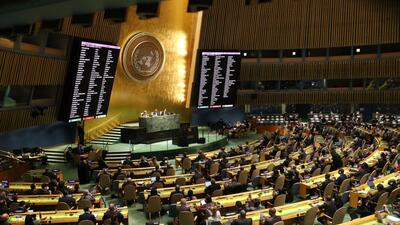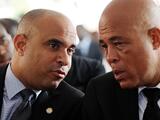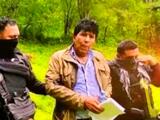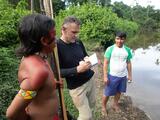Latin America split over response to Putin's invasion of Ukraine

For decades Cuba and Ukraine were humanitarian allies, united by the common cause of helping the ‘Children of Chernobyl.’
More than 25,000 radiation victims from the 1986 Chernobyl nuclear disaster -the vast majority Ukrainian children- have received free treatment in Cuba since 1990 in what is possibly one of Cuba’s most laudable global contributions to public health.
Even so, the Cuban government last week sided with Russia over President Vladimir Putin’s decision to invade Ukraine.
Cuba is one of several governments in Latin America that refused to join a United National resolution condemning the invasion. Instead, it chose to abstain, along with Nicaragua, El Salvador and Bolivia. Venezuela was not allowed to vote on the resolution as it is behind on its annual U.S. dues. However, its leader, Nicolas Maduro, expressed his support for Putin in a phone call on Tuesday, according to the Kremlin.
Cuba’s state media has also blamed the United States for provoking what it calls “the situation in Ukraine”, suggesting that Putin was justified in taking military action over concerns about NATO expansion on Russia’s borders.
Cuba's “close relationship with the Ukrainian people"
Cuba's permanent representative to the United Nations, Ambassador Pedro Luis Pedroso Cuesta, said Cubans are deeply saddened by the loss of innocent civilian lives in Ukraine, given the “close relationship with the Ukrainian people," he said.
In response, Ukraine’s government expressed its “strong protest” over Cuba’s support for “Russia’s aggression,” the country’s deputy foreign minister, Emine Dzheppar, tweeted in Spanish on Sunday.
Mexico rejects Russia sanctions
Other countries like Mexico have criticized the invasion in vague terms, avoiding mention on Putin. President Andrés Manuel López Obrador said on Tuesday that Mexico will not join the international sanctions on Russia, adding “we want to have good relations with all the governments in the world".
He also criticized what he called censorship of Russian state-sponsored media by social media companies.
Coincidentally, Russian oil company Lukoil last week completed its acquisition of a 50% interest in an offshore oil project in Mexico.
Some analysts say that kind of tepid response only emboldens the action of Putin at a critical moment when the Ukrainian government is fighting to survive the largest military attack on European soil since World War II.
“These U.N. votes may seem cosmetic to a lot of people, but what Putin needs is people voting with him and not to appear isolated,” said Erich de la Fuente, a Cuban-born professor of international relations at Florida International University (FIU).
Only four countries voted with Russia at the U.N., including North Korea, Syria and Belarus, while 35 abstained and 141 voted to condemn Russia’s aggression. A notable exception on the left was Chile's new president, Gabriel Boric, who emphatically joined the condemnation of Putin.
“The list of countries is not stellar,” not de la Fuente. “It’s a who’s who of the bottom of the freedom of the world rankings,” he added.
Russia has cultivated strong links to various governments in Latin America, including over $11 billion in sales of military hardware to Venezuela and Nicaragua, such as fighter jets, helicopters, tanks and armored vehicles, and air defenses.
Cuba's medical program for the 'Children of Chernobyl'
But it is Cuba’s action that is perhaps most shocking, given its special attachment to the children of Ukraine. Cuba’s medical aid to the victims of Chernobyl was greater than any country, according to Isabelle DeSisto, a PhD student at Princeton University, who has researched Soviet-Cuban relations, including the Chernobyl children.
“It was both an admirable humanitarian gesture and an excellent propaganda tool. Not only was it a way to showcase the advanced Cuban healthcare system, but it also demonstrated that Cuba was not merely a Soviet satellite state,” she wrote in a graduate essay competition.
She also noted that over the years thousands of Cuban students have studied in Ukrainian universities, in the cities of Kyiv and Kharkiv, which has suffered heavy bombardment in recent days, including a direct strike on the main university building.
As she watched this week the destruction in Ukraine this week, she told Univision that Cuba’s response “does strike me as quite ironic, given Cuba’s anti-imperialist position and it’s history of cooperation with Ukraine.”
In the years after the nuclear explosion at Chernobyl, thousands of children begun developing cancer, leukemia and skin diseases. Many lost their parents and other relatives in the aftermath.
Cuba’s gesture won Fidel Castro much praise at a time of mounting international, including Soviet, criticism.
''There can be no greater display of human sensitivity,'' wrote Castro in the visitors' book at the Juan Manuel Marquez hospital where the children were treated. The quality of Cuba's free health service is recognized as among the best in among all developing countries, despite its shortages.
The children were housed at a seaside resort at Tarara, known as ‘'Pioneer City’', normally used by Cuban pupils on study holidays.
The families expressed deep gratitude for Cuban doctors working around the clock, but reserved strong criticism for the Soviet authorities over the Chernobyl incident. They complained that news of the accident was kept from them, in some cases for up to two weeks, and many people were needlessly contaminated.
Cubans on social media express support for Ukraine
Many Cubans have rejected the war on social media and in messages to the Ukrainian Embassy in Havana, the Miami Herald reported. More than 300 members of Cuba’s independent civil society signed a statement supporting the Ukrainian people. “We have seen with dismay how the Cuban state, which claims to defend the inalienable rights and sovereignty of the peoples of the world, has not condemned the Russian military intervention in Ukraine,” the statement said.
A Cuban activist, Pablo Delgado, was detained and interrogated Saturday after leaving roses at the Ukrainian Embassy in Havana in a show of solidarity.
“Cuba is on the wrong side of history. It’s shameful,” said de la Fuente. Now 51, he recalled spending summers at Tarara as a child in the late 1970s.
Back then Castro made a big show promoting Cuba’s support for the children to help his image abroad, he said. “At least the children got help. Right now, where is that solidarity with Ukraine?” he asked.



